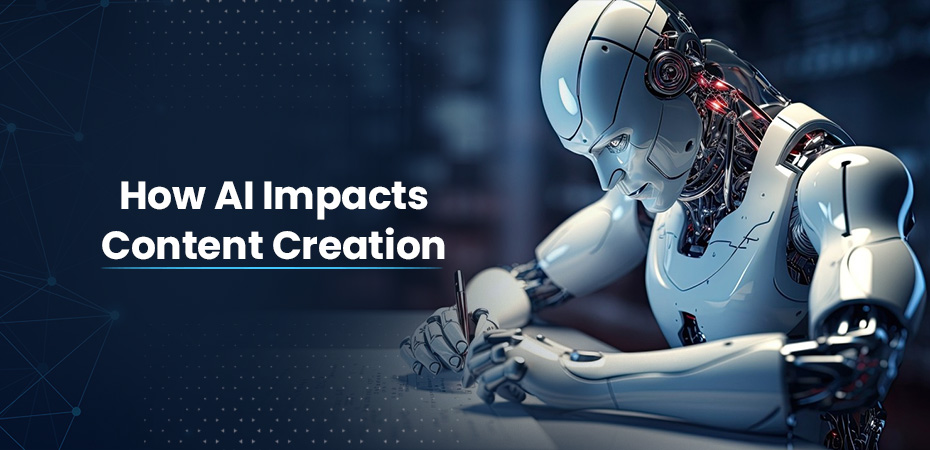How AI Impacts Content Creation



Introduction
In today’s digital world, it’s crucial to understand the benefits of AI Content Marketing. This refers to using artificial intelligence technologies to improve various aspects of content creation, distribution, analysis, and reporting. This innovative approach can transform how you interact with your audience and optimize your marketing strategies.
Recognizing the benefits of AI Content Marketing is essential for staying competitive. By leveraging AI tools, you can:
- Enhance personalization
- Automate repetitive tasks
- Process large datasets for actionable insights
This article explores the key benefits of AI in content marketing, including enhanced personalization, improved efficiency through automation, and advanced data processing. However, to fully harness these benefits, it’s also important to integrate effective SEO strategies into your content marketing efforts. Partnering with professionals who offer SEO services can significantly boost your online presence and drive targeted traffic to your site.
What is AI in Marketing?
Artificial Intelligence (AI) is crucial in today’s content marketing. It includes various technologies designed to imitate human intelligence, allowing machines to do tasks that usually need human thinking. In marketing, AI improves processes like creating, sharing, and analyzing content.
AI in content marketing uses machine learning algorithms to study data patterns and predict what customers will do next. This ability to foresee helps marketers create highly relevant and personalized content, making sure the right message gets to the right audience at the right time. AI-powered tools can also automate repetitive tasks such as scheduling and sharing content, giving marketers more time to work on strategic plans.
Different Types of AI Marketing Tools Available
There are many AI marketing tools out there, each one made for specific parts of the content marketing process:
- Content Creation Tools: These include platforms like Copy.ai and Jarvis that generate high-quality written content based on input prompts. They can create blog posts, social media updates, and even ad copy.
- Personalization Engines: Tools such as Persado and Phrasee utilize natural language processing (NLP) to craft personalized email subject lines and messaging that resonate with individual recipients.
- Content Curation Tools: Platforms like Curata and Buzzsumo help marketers discover trending topics and curate relevant content from across the web. These tools streamline content curation efforts by identifying what resonates best with your target audience.
- Analytics and Insights Tools: Solutions such as Google Analytics enhanced with AI capabilities, or specialized tools like Crimson Hexagon, provide deep insights into content performance. They analyze large datasets to uncover actionable insights that drive data-driven decisions.
- SEO Optimization Tools: Platforms like MarketMuse and Clearscope use AI to optimize content for search engines by analyzing keyword trends and suggesting improvements for better ranking.
Using these different AI marketing tools can greatly improve your content marketing strategy by:
- Automating routine tasks
- Personalizing user experiences
- Providing data-driven insights for informed decision-making
Key Benefits of Using AI in Your Content Marketing Strategy
Enhanced Personalization
AI allows you to create personalized content experiences that connect with your audience on a deeper level. By predicting customer behavior, AI tools can analyze past interactions, preferences, and browsing history to tailor content that meets individual needs. This enhanced personalization not only improves user experience but also increases engagement and conversion rates. For example:
- Predictive Analytics: AI algorithms forecast future behavior based on historical data, allowing you to anticipate what your audience wants.
- Content Recommendations: Tools like Netflix’s recommendation engine curate personalized content suggestions based on viewing history, showcasing the power of AI in creating tailored experiences.
Improved Efficiency through Automation
Automated processes are transforming the landscape of content marketing by significantly reducing the time and effort required for content creation and curation. AI-driven automation helps streamline repetitive tasks, allowing marketers to focus on strategic planning and creativity.
- Content Creation: Automated writing tools can generate articles, blog posts, and social media updates quickly. Platforms like WriterAccess offer solutions that combine AI with human expertise for high-quality outputs.
- Content Curation: AI-powered tools can sift through vast amounts of information to identify relevant content for your audience. This not only saves time but also ensures that your audience receives timely and pertinent information.
Advanced Data Processing
Data-driven decision-making is at the heart of effective marketing strategies. AI enhances this capability by processing large datasets at unprecedented speeds, extracting actionable insights that inform strategy adjustments.
- Analytics and Reporting: AI tools analyze metrics such as user engagement, click-through rates, and conversion rates to provide detailed reports that guide your marketing efforts.
- Predictive Modeling: By understanding patterns within data, AI can predict future trends and behaviors, enabling proactive adjustments to your strategy.
Implementing these benefits into your content marketing strategy can elevate your campaigns to new levels of effectiveness and efficiency. Using AI not only enhances personalization but also automates processes and provides deep data insights, making it an invaluable asset for any modern marketer.
Implementing AI Strategies in Your Content Marketing Efforts
Choosing the Right Tools
Selecting the appropriate AI marketing tools is crucial to enhancing your content strategy. Several popular options exist, each with unique features tailored to different aspects of content marketing:
- WriterAccess: Combines AI technology with a network of skilled human writers to deliver high-quality content. This platform leverages AI for topic generation, SEO optimization, and content scoring.
- Phrasee: Specializes in AI-generated copywriting for email marketing. It helps craft compelling subject lines and email content that engage recipients.
- Persado: Focuses on AI-driven language optimization to improve the effectiveness of marketing messages. Persado’s tool analyzes language patterns and suggests improvements to maximize engagement.
- rasa.io: Enhances newsletter personalization by using AI to tailor content based on user preferences and behavior.
When selecting an AI tool for your strategy, consider the following factors:
- Compatibility: Ensure the tool integrates well with your existing marketing platforms and workflows.
- Scalability: The tool should accommodate the growth of your business and handle increasing data volumes.
- Cost-effectiveness: Evaluate the pricing model against the potential return on investment (ROI).
- User-friendliness: A straightforward interface can save time and reduce the learning curve for your team.
- Support & Training: Look for providers offering robust customer support and training resources.
Integrating AI with Human Expertise
While AI brings numerous advantages, it is essential to balance its capabilities with human creativity for optimal results. Here’s why this balance is important:
- Creativity and Emotions: AI excels at analyzing data and generating insights but lacks the human touch needed for emotional engagement and creative storytelling.
- Quality Control: Human editors play a crucial role in reviewing AI-generated content to ensure accuracy, relevance, and tone alignment with brand voice.
- Strategic Oversight: Marketers need to interpret AI-driven insights within the broader context of their brand strategy and market dynamics.
By complementing human writers with AI technology, you can achieve high-quality outputs that resonate with your target audience while maximizing efficiency. This collaboration ensures that while AI handles data-heavy tasks, humans focus on strategic planning and creative execution.
Balancing these elements will help you leverage the full potential of both worlds—harnessing the power of AI without losing the invaluable human touch that drives authentic connections.
Measuring Success with AI-Driven Content Marketing Initiatives
Successfully measuring success in content marketing using AI solutions involves tracking specific key performance indicators (KPIs). These KPIs help you gauge the effectiveness of your AI-driven strategies and make data-informed decisions.
Key Performance Indicators (KPIs) to Track
1. Engagement Metrics
Monitor metrics like click-through rates (CTR), time on page, and social shares. AI tools such as Google Analytics and HubSpot can provide detailed insights into user interactions.
2. Conversion Rates
Track how many visitors convert into leads or customers. Tools like Optimizely and Unbounce offer conversion rate optimization features powered by AI.
3. Content Performance
Evaluate which pieces of content are driving the most traffic and engagement. Platforms like BuzzSumo use AI to analyze content performance across multiple channels.
4. Customer Sentiment
Understand how your audience feels about your content. Sentiment analysis tools like MonkeyLearn can process large volumes of text data to gauge customer reactions.
5. Personalization Effectiveness
Assess how well personalized content is resonating with users. Tools like Persado and Phrasee offer in-depth analytics on how personalized messages perform compared to generic ones.
Recommended Tools for Measuring Effectiveness
- Google Analytics: Comprehensive analytics platform that tracks a wide array of engagement metrics.
- HubSpot: Offers detailed insights into user behavior and engagement, along with powerful marketing automation features.
- BuzzSumo: Analyzes the performance of content across various platforms, providing valuable data on what works best.
- Optimizely: Specializes in conversion rate optimization, helping you understand the impact of different elements on user actions.
- MonkeyLearn: Uses AI for sentiment analysis, enabling you to measure customer sentiment accurately.
These tools provide actionable insights that help refine your content marketing strategy, ensuring continuous improvement and better results over time.
Conclusion
Exploring the benefits of using artificial intelligence in content marketing strategies reveals a landscape rich with opportunities. AI’s capabilities in personalization, automation, and data processing can significantly enhance your marketing efforts.
Adopting proactive approaches towards these technologies ensures you stay ahead in a competitive market. Leveraging AI doesn’t replace human creativity but complements it, leading to more efficient and impactful campaigns.
Understanding the benefits of AI content marketing encourages you to integrate AI tools thoughtfully while maintaining a balance with human expertise. This synergy can transform your content marketing strategy, driving future success.